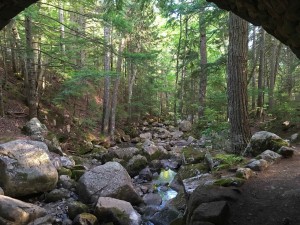I went for a trek in Acadia in Maine, along the Northern coast, in a light cool rain – and no one was on any of the paths through the woods.
You could hardly be closer to nature.
In the difficult places, in the woods, you have to pause to walk, to move more carefully, to pick your way.
I found inch high purple orchids, slightly agape, hanging in an array, against a seeming wall of wide green leaves and stems.
We have sights like this here at home but not everyone appreciates what we have.
There were large patches of soft green-white moss beneath my foot fall in Maine, and tender fibrous growths clustered on obstructing over-hanging limbs.
Where there wasn’t moss on the forest floor, there was what had once been vibrant flora, flattened dead tree limbs, pressed moist leaves and branches, fallen by age or wind or the brush of a deer, or even another human passerby.
We don’t have to go anywhere to have something like this in Western Loudoun but too many don’t appreciate what we have.
You had to dodge and tip toe carefully past swollen tree roots snaking across the narrow path, holding fast the earth below, knitting together what had been slowly strewn about the paths over time.
There are some leaves already thinking to turn, ferns bordering the dark woods beyond, shimmering shapes in the near distance in the morning’s soft wet breeze.
Why don’t more treasure what we have here.
There were open air views from within the woods, indeed a vast dramatic expanse, when you looked out from the forest, to peak from the paths, as you turned around this or that deciduous column in the natural cathedral that held you close, reminding you, you have to do more of this.
We have to preserve and protect what we have here – so we can do more of this.
There were the waters far below the cliffs, ebbing and flowing away, in rolling translucent waves of softly-changing colors, in elongated pools of blues, and greens, sometimes almost black, with silvery highlights, all the way eastward toward the gray morning light.
We may not have cliffs like what we find in Acadia besides the Potomac but there are jaw dropping vistas close to home and light and season make for a changeable show.
The moist air filled you up, opening your lungs, almost as effectively as a shot of espresso.
And it was quiet, except for the sound of the leaves and the trees brushed by the wind.
Man more and more exists separate from this entwining connection with nature that can make us whole and authentic.
If we give it a chance, a walk in the woods may even stir Proustian remembrances from whence we once came now only barely recalled.
The ever-widening separation from nature can only spawn indifference to what makes us and this world special, serve to make us value less, or not at all, what surrounds us, force nature into retreat, before gravel grinding monsters, our so-called humanity knowing no risk to nature, caring not enough, or caring not at all.
No question, we have proven, as man, we are good at extinction.
Maine is being pressed, without question, like here, by those who don’t get what Maine struggles to preserve and protect, what we struggle to preserve and protect.
People ask what life is about.
Whatever that is, the answer is in large part being closer to nature.
Still many seem desperate to figure it out.
Perhaps the answer is not so obscure.
Bessie Parkes summed it up in some wonderful poesy:
“All natural things both live and move
In natural peace that is their own
Only in our disordered life
Almost is [nature] unknown.”

